 Left to right: Nezar AlSayyad, Chair of the Center for Middle Eastern Studies; Thomas G. Barnes, history and law professor; David D. Caron, law professor; David Leonard, dean of International and Area Studies; Laura Nader, social cultural anthropology professor; Steve Weber, political science professor; and Janet Yellen, economics and business administration professor. (BAP photo) |
UC Berkeley faculty analyze, criticize — and defend — Iraq war
| Webcast: Watch the "Campus Forum: Implications of War in Iraq," 1:58 hrs |
BERKELEY - A panel of UC Berkeley faculty convened on Tuesday evening, April 1, to discuss the economic, political and regional implications of the U.S.-led war on Iraq. "Our intent is to put as many ideas on the table as we can to have an informed discussion," said Chancellor Robert M. Berdahl, who introduced the forum.
Although the Zellerbach Hall audience, like the broader American public, might feel overwhelmed by the bombardment of information from hundreds of reporters in the field, "information is not wisdom," Berdahl cautioned. Through the unique perspective of a university, "we can ask hard questions even in hard times."
| Read the complete remarks by: Chancellor Berdahl Nezar AlSayyad Thomas G. Barnes David D. Caron Laura Nader Steve Weber Janet Yellen Q&A with audience |
But although the speakers touched on Berdahl's three concerns, the question they seemed most compelled to examine was the most elemental of all: was the war in Iraq "just," or defensible, whether for reasons of national security, international stability, or moral responsibility.
'This is a war of choice, not necessity'
David K. Leonard, dean of International and Area Studies and a political science professor at UC Berkeley, introduced the six faculty members, who spoke in alphabetical order. The first was Nezar AlSayyad, a professor of architecture and chair of the university's Center for Middle Eastern Studies.
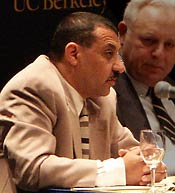 'Not only is dissent being labeled unpatriotic, but the single act of having an opinion that does not simply repeat the official line of the administration is grounds for dismissal ...' —Nezar AlSayyad
|
"My argument is very simple. For us, this war is a war of choice and not necessity; and that those who exercise choice have to pay its price! The question is whose choice and what price?" The price, he continued, was the sacrifice of the world's respect: "[R]emoving a dictator from power may be a noble intent but it is one that did not deserve a war ... why this dictator and not others? Libya, Syria, Pakistan and North Korea have dictators, some of whom boast of having weapons of mass destruction. Can we not see that the word is laughing at the hypocrisy of our position?"
AlSayyad insisted that while "we have to support our fellow countrymen and women sent abroad to fight a war not of their own making or choosing, but we also and equally have to protest the action and tactics of this administration." He alluded to the risk he took as an Arab-American in making such criticism publicly but said the real danger was that the United States will smother internal dissent to the point that it comes to resemble its enemies.
"Not only is dissent being labeled unpatriotic, but the single act of having an opinion that does not simply repeat the official line of the administration is grounds for dismissal ... What is happening to our nation?" he asked. "When I hear the media speaking about the president and his two sons, I no longer know which president they are talking about, theirs or our former one. It is indeed an ironic situation."
Drawing parallels to the first time the United States became involved in the Middle East — 200 years ago, when pirates from the Barbary Coast (Algeria and Libya) were attacking U.S. ships and enslaving their crews — AlSayyad listed the measures taken then for homeland security. They included "the toughest immigration laws of the time; the random stopping and searching of suspicious individuals; and the arrest and deportation of Muslim aliens. Today, these measures sound eerily familiar." The difference, he said, is that "back then the guardians of liberty and justice spoke up. The Virginia legislature passed an act originally written by Thomas Jefferson to protect the religious freedom of Muslims and to prevent their deportation en masse ... Who is our Jefferson today?"
In his conclusion, AlSayyad said that despite the dire circumstances he saw unfolding, he carried some hope. "As the events of Civil Rights, the Vietnam War, Watergate, and the divestment campaign against the former apartheid regime of South Africa have taught us, periods of ignorance and indifference always come to an end. Perhaps this is the good lurking under the evil of this war, one that will allow us to reclaim our country." (Full text of AlSayyad's remarks.)
'The only way Saddam Hussein will be disarmed is to lose power'
The next speaker, history and law professor Thomas G. Barnes, acknowledged that although his position "is unpopular in the Berkeley context," he intended to defend President Bush's reasons for going to war and the necessity of that war.
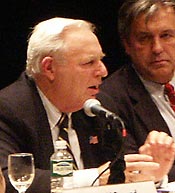 'Americans are prepared to take casualties in a just war, and this is a just war. It may not seem so in Berkeley, but it does elsewhere' —Thomas Barnes
|
"One is struck by the fact — and I think it is a fact — that the only way Saddam Hussein will be disarmed is to lose power," he said. Barnes acknowledged that objections to the war are many, particularly from his fellow panelists, "but I don't think many are persuasive. After the war is over, we will see the true horrors of Saddam Hussein's regime," and once Iraqi citizens feel safe enough to express themselves freely, we will see "widespread support" of that regime's demise.
Barnes went on to predict that this would be a complex war, probably not a short one, and that it would take its toll in U.S. lives. "Americans are prepared to take casualties in a just war," he said, "and this is a just war. It may not seem so in Berkeley, but it does elsewhere." The death toll will probably be lower than in previous wars, he asserted, thanks to new technology and the higher value that Americans are putting on their own soldiers' lives as well as on those of civilians and even enemy soldiers.
In response to Berdahl's introductory questions, Barnes predicted there would be other conflicts, calling war "the default position of mankind." An Israeli-Palestinian peace is critical to achieve, he added, as long as it does not result in Israel's being driven into the sea. And he predicted the Iraq war would neither increase nor reduce the incidence of terrorism, which "will be with us for a very long period of time." (Full text of Barnes's remarks.)
'Discretionary self-defense'
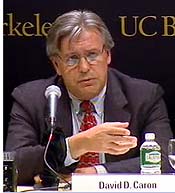 'Having deployed the troops, the United States needed to move this spring. The logic of a military buildup undermined and made disingenuous to other states the seriousness of the diplomatic effort.' —David Caron
|
Before launching into a discussion of the war's implications for international law and institutions like the United nations and NATO, Caron warned, "Legality should not be confused with the wisdom of a choice, with the legitimacy of that choice, or with morality. Just because one has the right possibly to do something does not mean that one should do so."
He then examined the Bush administration's attempts to justify the war's legality under an expanded definition of self-defense as outlined in the United Nations Charter. (Editor's note: An earlier version of this story incorrectly presented Caron's remarks as deeming the actions legal under the current charter.) The U.S. government, he said, argued that as a nation threatened by another nation possessing weapons of mass destruction, it had a right to defend itself before an attack occurred, or to employ "preemptive self-defense."
However, he said, "the conventional wisdom has been that a stable international order requires a doctrine on use of force with bright lines. An armed attack is a bright line. The assertion that another country's possession or possible possession of weapons of mass destruction and that country's hostile intent, or possible hostile intent toward a target country, is not a bright line. Indeed, in my mind, the element of objective restraint in the proposed doctrine of preemptive self-defense is so minimal that it is more a statement of what I would call discretionary self-defense."
Caron thought that the United Nations had been strengthened, rather than destroyed, by Washington's opting to move without its sanction. Just as the U.N. was wrongly written off after its International Court of Justice censured U.S. activities in Nicaragua without result, it has gained credibility by its willingness to stand up to America. "Don't count the United Nations out at all ... The U.N. will be even more important to the rest of the world" in the days to come, he said.
The Bush administration has done untold damage in the area of diplomacy, Caron charged, out of a hostility to multilateral approaches that predated September 11. The continuation of that approach even after 9/11 "has led to a tremendous squandering of good will," and the loss of a "sympathy that could have been used to strengthen multilateralism." By deploying troops to the Gulf region long before it addressed the problem in the United Nations, the U.S. never seemed serious to its neighbors about resolving the crisis peacefully, Caron said: "The primary reason for the failure is the resolution was pushed. We all felt it being pushed. The moving dynamic for the resolution this spring, rather than this fall or later, was the presence of such substantial number of troops in the region. Having deployed the troops, the United States needed to move this spring. The logic of a military buildup undermined and made disingenuous to other states the seriousness of the diplomatic effort."
Caron concluded with a quotation from Dwight D. Eisenhower's 1953 inaugural address: "Whatever the United States seeks to bring about in the world, it must first bring about in the heart of America." (Read the full text of Caron's speech.)
'Americans need to start practicing democracy'
Professor of Social-Cultural Anthropology Laura Nader followed Caron. Nader's work focuses on how central dogmas are made and how they work in law, energy, science and anthropology, and she came out swinging.
"A Vietnam veteran put it bluntly to me when he said, 'We've lost all three branches of government — the Judiciary when they selected the President; the Congress when they abdicated to the Executive Branch; the Executive when they refuse to listen to dissenting Americans,'" Nader said, calling the Bush administration's justification for war "unsubstantiated assumptions fed to the public ad nauseam."
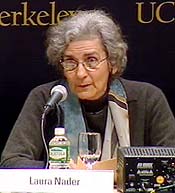 'Our leaders might listen to dissenting voices as a way to avoid miscalculations. Islam is the world's and America's fastest growing religion — 1.2 billion people should give pause to those who think only of military victories.' —Laura Nader
|
Having taught course about the people and cultures of the Arab world at Berkeley since 1960, Nader noted an instructive, consistent stereotypes held by the West and east about each other. "I've noticed mirrored images. The Arab historians of the Crusades thought the Crusaders barbaric savages, ignorant of medicine. They said they had no culture, no civilization, but they noticed they had technology," she said. "Gandhi said the same thing in the 20th century." And yet the West — in particular, the United States — continues to view the non-Christian world as the more barbarous one.
Nader challenged the necessity of this "unilateral invasion of a sovereign country," likening it to "taking a baseball bat to a bees' nest." But those who protest the war are not getting heard, she said, and the media has been far too obsessed with the conflict's tactics and technology to examine its politics. "Our leaders might listen to dissenting voices as a way to avoid miscalculations, as a way to develop criteria for what it means to win or lose," she cautioned. "Islam is the world's and America's fastest growing religion — 1.2 billion people should give pause to those who think only of military victories ... Americans need to start practicing democracy. If we did, we wouldn't have to sell it." (Read the full text of Nader's remarks.)
'The way to win at chicken is to throw your steering wheel out the window'
Political science professor Steve Weber, in contrast, said at the outset of his presentation that he would not "take an explicit position for or against this particular war." The director of the MacArthur Program on Multilateral Governance at Berkeley's Institute of International Studies, Weber's youthful demeanor stood in contrast to his experience. He has held academic fellowships with the Council on Foreign Relations and worked with the U.S. State Department and other government agencies on foreign policy issues, risk analysis and forecasting.
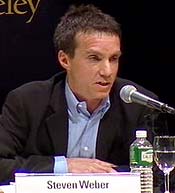 'Pre-emption shifts the initiative back to our side and lets us shape the battlefield of world politics, rather than respond to it. Which works sometimes ... ' —Steven Weber
|
The Iraq war is primarily "a war about oil, and about the mistakes we made in 1991," Weber said. The reasons for it are the same as a dozen years ago, because "we didn't go all the way to regime change" in the Gulf War, and in the years since the U.S. has done nothing to reduce its dependence on fossil fuels.
Without giving his personal opinion, Weber said it was possible to understand why the Bush administration felt the status quo was unacceptable. Their exasperation with Saddam Hussein's continued grip on power existed before 9/11, he maintained, and the terrorist attacks that day did nothing to change it even though there is "no substantial evidence — at least no public evidence — that the regime in Iraq had anything to do with that event. But September 11 completely changed the domestic politics here in the U.S."
Weber called President Bush's advisers "Wilsonian idealists at heart. They have an activist and revolutionary vision for the world that would make George Kennan blush; they believe deeply in the efficacy and sustainability of overwhelming U.S. power; and they fear that if they don't grasp the opportunity in front of them, the world will be a much less desirable place for America in 2010 than it is today."
Returning to the issue of "preemptive self-defense" that Caron had examined earlier, Weber said that "preemption shifts the initiative back to our side and lets us shape the battlefield of world politics, rather than respond to it. Which works sometimes," he added, pointing to the fact that even those who criticize the war do not defend Hussein's regime.
But when it doesn't work, Weber warned, preemption creates multiple games of "chicken," in which potential target nations try to find a way to strike first. "Anybody know how you win at chicken?" he asked. "Thomas Schelling got it right in 1961: the way to win at chicken is to throw your steering wheel out the window, so the other guy has to swerve. The question then becomes who can throw their steering wheel out the window first: Iran, Syria, North Korea, or the U.S?"
Weber next moved to a discussion of the possible reconfiguration or replacement of global institutions like the U.N. Security Council and NATO. "The natural allies for the United States in the next phase of globalization are probably countries like Poland, Brazil, Slovakia, Kazakhstan, Singapore, and perhaps a postwar Iraq," he said. "If that sounds bizarre to you, ask yourself if it sounds any more bizarre than it must have sounded to people in 1949 to talk about a North Atlantic Treaty Organization with France and Germany as our core allies and as each other's allies.
"In my view, the sooner we get done with Iraq and move on to defining the principles that will hold together a coalition for the new world order, the better." (Full text of Weber's remarks.)
'This administration's priorities are completely out of whack'
The last speaker was Janet Yellen, who addressed the war's economic implications. A professor of economics and business administration, Yellen formerly chaired President Clinton's Council of Economic Advisors and the Economic Policy Committee of the Organization for Economic Cooperation and Development and was a member of the Board of Governors of the Federal Reserve System as well as an adviser to the Congressional Budget Office.
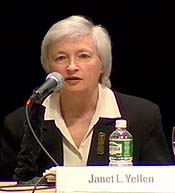 'No past president, to the best of my knowledge, has ever eagerly proposed higher taxes to pay for a war. But the Bush Administration has moved in the reverse direction ...' —Janet Yellen
|
Other economists, including Fed Chairman Alan Greenspan, believe that the U.S. has shrugged off its economic hangover following the stock-market bubble of the late 1990s, but Yellen is more pessimistic. She worries that the "various 'worst-case' scenarios — involving significant oil disruptions in Iraq or its neighbors, lengthy urban combat, a spread of hostilities beyond Iraq or use of chemical and biological weapons" — will not be entirely avoided, leading her to believe that "consumer and business confidence may remain low even after the war ends and the U.S. and its neighbors will be vulnerable to recession."
Although many casual observers of history think that wars jumpstart economies, Yellen reminded the audience that "war spending during World War II amounted to over 40 percent of GDP. The scale today is entirely different: $100 billion of war spending amounts to only 1 percent of GDP in our $10 trillion economy."
Yellen then began methodically demolishing the Bush administration's economic projections and policies. "No past president, to the best of my knowledge, has ever eagerly proposed higher taxes to pay for a war," she said. "But the Bush Administration has moved in the reverse direction, with its proposal for escalating commitments to large tax cuts for the rich, at a time when the future costs of the Iraqi rebuilding program coupled with rising defense and security expenditures have worsened an already bleak long-term fiscal outlook."
In conclusion, Yellen said, "Budgets often seem boring. But they quantify an administration's priorities ... To my mind, this administration's priorities are completely out of whack." (Full text of Yellen's remarks.)
'What if the U.S. stops the war or loses it?'
After the last of the formal presentations, the panelists took written questions from the audience. The first asked about the constitutionality of the war. Caron replied that there was a resolution from Congress in support of it. "I suppose the administration would argue that it didn't even need that, but they did get it," he shrugged. "What is striking is the breadth of the original resolution that was requested... It is always dangerous to give too much."
Leonard then summarized a pile of questions relating to Europe as, "So with Europe as the focus of our thoughts, what do we see in the shape of a postwar set of institutions and relations?"
Barnes jumped first. "I think the present discontent with Europe from the American perspective and the administration's perspective are probably pretty short term," he said. "There will be a great deal of business as usual in all those areas in which the U.S. and most European nations interface. ... The relationship between the U.S. and France is going to be bumpy for a bit, but I don't think this is a matter of falling out with our allies, especially since America is a major power in the world."
The next question seemed to leave the panelists — and the audience — at a loss for words. "What would happen if the U.S. stops the war, or loses it?" Leonard read.
Nader was the first to recover and grab the mic. "If the U.S. stops the war, we could use the money for education and national health insurance!"
'Vulnerability' and 'blowback'
Barnes could not let that pass, insisting that the U.S. had been "fundamentally changed" by 9/11. "Our vulnerability is clear and evident. That is what the preemptive doctrine is intended to do, to make it less vulnerable. That's why American security is indeed involved in whether Saddam Hussein has weapons of mass destruction, and North Korea also. I think Bush understands this. I think a great many Americans understand this, at least implicitly. I don't think anybody else in the world does yet — maybe Tony Blair. But I really wonder if other people do. This is what is going to drive American foreign policy for a very long time. It's what makes even the thought of losing this war unthinkable."
Nader responded that the term "blowback" had been invented by the CIA in the 1950s to describe the unforeseen consequences of American foreign-policy meddling. "Chalmers Johnson, the political scientist who used to teach here, wrote a book the year before 9/11 called 'Blowback' in which he again elaborated why a 9/11 might happen because of U.S. foreign intrigues abroad," she said. "We can't act like we had nothing to do with having created that vulnerability."
AlSayyad stepped in to turn the original question on its head. "Nobody really wins war," he said. "I think what prevails in the end is a particular vision of a world order which supposedly the victors wanted and are going to enforce. I actually worry about winning a war that while it may be justifiable, it is unjust. What will it do to us, to win such a war?"
A question about Turkey's refusal to cooperate with U.S. plans for war produced the only acknowledged point of agreement between Nader, Weber, and Barnes — that Turkey's refusal had more to do with its desire to handle the Kurds in Northern Iraq without U.S. interference than it did with disagreement with the war's intent. Said Barnes, "I think it's quite a testimony that Turkey is sufficiently democratic that it would so refuse our, how would one say, blandishments. That doesn't mean the blandishments were wrong."
In answer to a follow-up question about what the war might do to U.S. relations with the rest of the Muslim world, AlSayyad took the lead. He quoted a Middle Eastern dictator who said, "Before 9/11, there was one Bin Laden. After the attack on Iraq, there will be a thousand." He went on to say that the U.S. military failure to anticipate that Iraqis would resort to suicide bombing tactics was a grave error, a failure to realize that wars of the 21st century will be different from anything we have seen before. "People don't value their lives anymore. They have gotten to a point where there's absolutely nothing to lose. So in a sense suicide bombers are essentially weapons of mass destruction," he said. "What do we do with them? Do we go and decimate an entire people because all of them can be suicide bombers at any given time? I fear that that is precisely where we are headed."
Read the complete remarks by:

